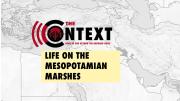This is the sixth post of "The Context"—a biweekly series of archival stories—offering our readers a useful background to some of the most important subjects in the news today. We hope you enjoy it.
As the battle for Mosul in 2016 was raging in Iraq and journalists headed toward the region, photojournalist Emilienne Malfatto went the opposite direction. “I was in search of another view of the country,” she wrote in a photo essay in The New York Times, “something different from the war I’d been covering for the previous year and a half.” She began exploring the Mesopotamian marshes, once the largest wetland ecosystem of Western Eurasia but since imperiled by climate change and human influence:
During the Iran-Iraq war, waged between 1980 and 1988, the wetland’s proximity to the Iranian border turned the area into a conflict zone, a theater for bloody battles. Later, in the early 1990s, in the aftermath of a Shiite uprising against his Baath Party, Saddam Hussein intentionally drained the region—where many of the Shiite rebels had fled—as a punishment and a way to stifle the insurrection.
By the end of the 2000s, she writes, “less than 10 percent of the area’s original wetland existed as a functioning marshland.” The area has been re-flooded and partially restored, but Malfatto’s photographs capture a region—and its inhabitants—at a social and ecological crossroads.
The photo essay reminded me of “Paradise Lost,” a 2005 feature by the magazine’s late executive editor Christopher “Kit” Reed. Asking what could be done about this “environmental crime of the century,” he explored the complex history of the Mesopotamian marshes all the way back to their influence on the world’s first cities—Ur, Uruk, Eridu, Lagash, Larsa. Reed explained that even before Hussein committed what scholars he consulted called both ecocide and genocide, Iraqi dams built in the 1950s harmed the marshland, limiting fresh water flow to the area. To make matters worse, the flow into the Tigris and Euphrates is largely controlled not by Iraq, but Turkey. “Right now the flows coming into Iraq are about a third to a half what they were 12 years ago, before Turkey put in dams, and the water quality is much poorer,” said Edwin Theriot, then director of the environmental laboratory of the Army Corps of Engineers. “If Turkey implements all of its irrigation projects, it would bring the Tigris to a drip.”
More recently, managing editor Jonathan Shaw profiled John Briscoe, then McKay professor of the practice of environmental engineering and professor of the practice of environmental health—and an expert on water insecurity around the world. In 2014, shortly before his death, Briscoe received the Stockholm Water Prize, also known as the “Nobel Prize of Water” for his “unparalleled contributions to global and local management of water…that have improved the lives and livelihoods” of millions of people worldwide. “Water issues are not just about scarcity or potability or floods,” Briscoe explained in “The Water Tamer”—they are part religion, part politics, part civilization. “Take Three Gorges Dam. From a distance it is perceived as the largest hydroelectric project in the world—which it is.” But what is the meaning of Three Gorges? “In Chinese history, the fall of emperors is associated in the popular mind with an inability to control floodwater: the emperor who does not control water will not last.” Dams are thus symbols of social order. “That symbolism, at least as much as the hydropower and flood control, is what Three Gorges is about”: the efficacy of the state. In India, where Briscoe lived for several years, the Ganges is deeply entwined in the country’s language, culture, history, and political order, he continues, as well as with such concerns as energy, health, agriculture, and the environment. “Water truly branches into all aspects of life.” The piece is an eye-opening guide to a widening problem—in Pakistan, the developing world, and now in the drought-plagued American West.
Another feature by Shaw, about historian David Blackbourn’s account of German attempts to tame the Rhine, also remains relevant. The people living along the Oderbruch, a waterlogged, low-lying agricultural region along the Oder River, were much like the Iraqi citizens living along the Mesopotamian marshlands—largely at the mercy of state attempts to eliminate marshes and reclaim land for agriculture. The residents of the Oderbruch, says Blackbourn, lived “primarily as fishermen, from the rich stocks of carp, perch, pike, bream, barbel, ide, tench, lamprey, burbot, eel, and crabs. But they also produced hay and pastured animals when water levels were lower, using animal dung mixed with mud and bundles of twigs, or fascines, to construct protective walls against floods; and on those walls they grew squash and other vegetables.” Though Blackbourn discourages “any idealization of their former existence,” their way of life was, he writes, “neither so irrational nor so abjectly vulnerable to the elements as officials and later writers often assumed. Their economy was carefully geared to the normal cycle of floods that occurred, before the reclamation, each spring and summer....” They had “evolved small-scale local solutions that permitted them to survive and fashion a livelihood from the waters until large-scale state ‘improvement’ came along. We should not overlook this evidence of resourcefulness and ingenuity, wiped out by technological hubris married to state power. Something was lost, and that is one of the registers in which we should tell the history of reclamation.” Human interventions in nature, often but not always well-intentioned, have increasingly troubling and unforeseen effects on access to essential supplies of clean water. As Blackbourn sums up, “history cannot make us wise, but perhaps it can make us a little less foolish.”
More from “The Context”
- How Exercise Gives Us Purpose: Reviewing our best articles on exercise
- Arthur C. Brooks on "Revenge Bedtime Procrastiination": Presenting our best archival work on sleep
- Universities Pushed to Reckon with Slavery: Students and activists advocate for institutional change.
- Simpsons Writer John Swartzwelder on Comedy: Sharing some of our best work on comedians and their craft
- Daniel Lieberman on Food Addiction: Framing the news with our best articles on diet and health









